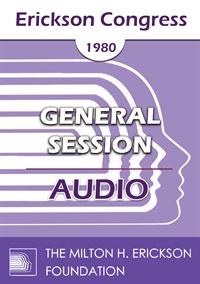IC80 General Session 06 - Mental Research Institute Panel - Paul Watzlawick, PhD; John Weakland; Richard Fisch, MD
- Average Rating:
- Not yet rated
- Topic Areas:
- General Sessions | History of Psychotherapy | Ericksonian Hypnosis and Therapy Techniques | Milton Erickson
- Categories:
- Erickson Congress | Erickson Congress 1980 | Pioneers in Couples and Family Therapy
- Faculty:
- Paul Watzlawick, PhD | John Weakland | Richard Fisch, MD
- Duration:
- 1:54:30
- Format:
- Audio Only
- Original Program Date:
- Dec 06, 1980
- License:
- Never Expires.
Description
Description: A panel of experts discusses Milton Erickson's revolutionary contributions to psychotherapy, exploring his innovative techniques that challenged traditional therapeutic approaches. Panelists examine Erickson's emphasis on direct intervention, communication strategies, and brief therapy methods that prioritize behavioral change over long-term insight.
Credits
Handouts
| Timestamped Transcript (1.1 MB) | 27 Pages | Available after Purchase |
| Ericksonian Learning Snapshot (252.8 KB) | 2 Pages | Available after Purchase |
Faculty

Paul Watzlawick, PhD Related Seminars and Products
Paul Watzlawick, received his Ph.D. from the University of Venice in 1949. He has an Analyst's Diploma from the C.G. Jung Institute for Analytic Psychology in Zurich. Watzlawick has practiced psychotherapy for more than 30 years. He was research associate and principal investigator at the Mental Research Institute. He was Clinical Professor at the Department of Psychiatry and Behavioral Sciences, Stanford University Medical Center. Watzlawick is a noted family therapist; he is recipient of the Distinguished Achievement Award from the American Family Therapy Association. Also, he is author, co-author or editor of eight books on the topics of interactional psychotherapy, human communication and constructivist philosophy.
He formulated five axioms. They are:
- It is not possible to not communicate. Every behavior is some kind of non-verbal communication.
- Every communication has a content. In addition, there is 'metainformation', which says how the communicator wants to be understood.
- All partners involved in a communication process also interpret their own behaviour during communication.
- Human communication involves both verbal and non-verbal communication. In addition to the spoken words, there are is also a non-spoken part (gestures, behavior, intonation..) which is part of the communication.
- Communication between humans is either symmetric or complementary. This is based on whether the relationship of those communicating is based on differences or parity.

Richard Fisch, MD Related Seminars and Products
RICHARD FISCH, MD, is a psychiatrist in private practice; consultant to the San Mateo County Juvenile Probation Department and Director of the Brief Therapy Center at the Mental Research Institute. Dr. Fisch has co-authored Change - Principles of Problem Formation and Problem Resolution and The Tactics of Change - Doing Therapy Briefly. He is recipient of awards for family therapy from AFTA and AAMFT.


